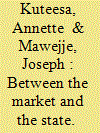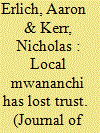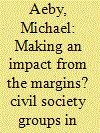|
|
|
Sort Order |
|
|
|
Items / Page
|
|
|
|
|
|
|
| Srl | Item |
| 1 |
ID:
148948


|
|
|
|
|
| Summary/Abstract |
This study assesses the capabilities of business associations for conducting meaningful policy engagements with government. Using information from 21 associations and five state institutions, this work investigates the level of autonomy and ability of business associations to coordinate and order their interests for policy decision-making. Findings reveal that the ability to organise an association's own interests is hindered by weak systems and internal structures, especially at sub-sector level. Most associations are financially weak, have limited professional expertise and experience a low level of commitment from members, which affects their capacity for autonomy. It is important that business associations create regulations to make membership ties binding, so as to strengthen their influence on policy. Associations should also be more aggressive in mobilising finances, and they should identify synergies and develop partnerships with the state to build their capacity for participating in policy-making.
|
|
|
|
|
|
|
|
|
|
|
|
|
|
|
|
| 2 |
ID:
148946


|
|
|
|
|
| Summary/Abstract |
Why did the Ghanaian state go to such extraordinary lengths to facilitate the reliable broadcast of the World Cup in 2014? During a period of frequent power outages, Ghana swapped power with regional neighbours and directed major domestic industries to reduce production in order to allow Ghanaians to watch their national soccer team compete in the World Cup. This paper investigates the politics of the public service provision of electricity in Ghana. We focus on the short-term crisis during the 2014 World Cup to reveal the citizens' and politicians' expectations about electricity as a public good. Drawing on an analysis of archival documents, Ghanaian newspapers, and interviews with government, business, and NGO officials in the energy sector, we argue that the Ghanaian state historically has created the expectation of electricity as a right of national citizenship and explore how this intersects with competitive party politics today.
|
|
|
|
|
|
|
|
|
|
|
|
|
|
|
|
| 3 |
ID:
148947


|
|
|
|
|
| Summary/Abstract |
Old Fadama in Accra, Ghana, is a vast informal settlement. A legalistic approach by successive governments has meant a near-absence of statutory institutions and the emergence of alternative public authorities. These endeavour to provide the area with a range of basic public services to solve the area's serious developmental challenges. Through processes of informal negotiation residents establish rights and social contracts that underpin and define what will constitute ideas of state and law. At the same time, self-governance emerges while relations with statutory institutions shift back and forth between vilification, tacit acceptance, and productive cooperation. The article contributes to studies of governance in informal urban settlements on two fronts. First, it shows how informal arrangements lead to the provision of basic public services and influence the workings of formal institutions of government. Second, it challenges facile understandings of large-scale informal settlements as generally chaotic, lawless or subversive.
|
|
|
|
|
|
|
|
|
|
|
|
|
|
|
|
| 4 |
ID:
148950


|
|
|
|
|
| Summary/Abstract |
Across African democracies, maintaining popular trust in electoral management bodies (EMBs) is vital to enhancing election integrity and, ultimately, regime legitimacy. However, scholars have largely sidestepped any systematic analysis of how citizens formulate their attitudes towards EMBs and how these attitudes vary over time. To address these gaps in the literature, we focus on Kenyan EMBs, which have experienced fluctuating popular support since the ruinous 2007 elections and subsequent institutional reforms. Using primary election reports and original survey and focus group data, we analyse the sources of Kenyans' trust in EMBs from 1992 onward and probe the 2013 election period deeply. Across time, we find that confidence in EMBs usually collapses after polarised elections, due to perceived problems with the EMB's autonomy and capacity. Following the 2013 elections, Kenyans were also more likely to lose confidence in the EMB if they were affiliated with losing presidential candidates or if they were critical of EMB performance.
|
|
|
|
|
|
|
|
|
|
|
|
|
|
|
|
| 5 |
ID:
148951


|
|
|
|
|
| Summary/Abstract |
The paper examines the role of civil society organisations (CSOs) in Zimbabwe's interim power-sharing process. It identifies CSOs’ organisational capacity, nature of engagement in the political process and relations with the power-sharing parties as the principal issues affecting CSOs’ ability to promote peace-making and democratisation in the context of a transitional executive power-sharing process. Based on these analytical themes, the case analysis argues that CSOs’ sway on the transition was particularly constrained by organisational fragmentation and disunity, divergent strategies vis-à-vis the interregnum, diminishing access to political elites, the latter's refusal to permit greater civic involvement, and continued repression.
|
|
|
|
|
|
|
|
|
|
|
|
|
|
|
|
| 6 |
ID:
148949


|
|
|
|
|
| Summary/Abstract |
This article examines the relationship between the politics of ethnicity and road construction in Hawassa, Ethiopia. The Ethiopian state has recently invested unprecedented amounts of money in the construction of urban roads. These roads both undermine and reinforce longstanding ethnic hierarchies within Ethiopian cities. Contrary to the image promoted by the state of harmony among residents of different ethnic backgrounds, our research revealed a great deal of tension, particularly concerning the distribution of benefits from state-led infrastructural development. The experiences of residents in rapidly changing neighbourhoods, demonstrate that the benefits of recent road construction are not necessarily distributed according to the policies of the current regime. Instead, historical inequalities interact with contemporary urban development in ways that may actually disrupt the state's vision of unity through diversity. Stratification is built into the city and attempts to reshape the city necessarily interact with recent and long-standing inequalities.
|
|
|
|
|
|
|
|
|
|
|
|
|
|
|
|
|
|
|
|
|